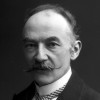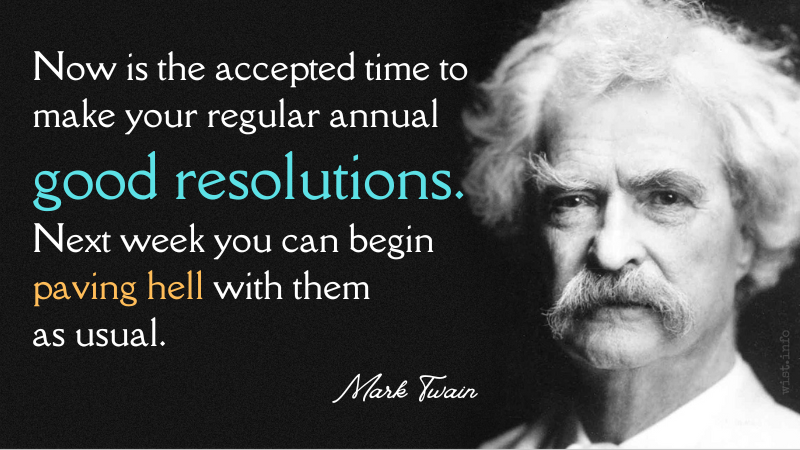Firmness in decision is often merely a form of stupidity. It indicates an inability to think the same thing out twice.
H. L. Mencken (1880-1956) American writer and journalist [Henry Lewis Mencken]
A Little Book in C Major, ch. 5, § 30 (1916)
(Source)
Variant:
FIRMNESS: A form of stupidity: proof of an inability to think the same thing out twice.
[A Book of Burlesques, "The Jazz Webster" (1924)]
Quotations about:
resolution
Note not all quotations have been tagged, so Search may find additional quotes on this topic.
A resolution to avoid an evil is seldom framed till the evil is so far advanced as to make avoidance impossible.
Determination in a single instance is an expression of courage; if it becomes characteristic, a mental habit. But here we are referring not to physical courage but to courage to accept responsibility, courage in the face of a moral danger. This has often been called courage d’esprit, because it is created by the intellect. That, however, does not make it an act of the intellect: it is an act of temperament. Intelligence alone is not courage; we often see that the most intelligent people are irresolute. Since in the rush of events a man is governed by feelings rather than by thought, the intellect needs to arouse the quality of courage, which then supports and sustains it in action.
Looked at in this way, the role of determination is to limit the agonies of doubt and the perils of hesitation when the motives for action are inadequate.
[Die Entschlossenheit ist ein Akt des Muthes in dem einzelnen Fall, und wenn sie zum Charakterzug wird, eine Gewohnheit der Seele. Aber hier ist nicht der Muth gegen körperliche Gefahr, sondern der gegen die Verantwortung, also gewissermassen gegen Seelengefahr gemeint. Man hat diesen oft courage d’esprit genannt, weil er aus dem Verstande entspringt, aber er ist darum kein Akt des Verstandes, sondern des Gemüths. Blosser Verstand ist noch kein Muth, denn wir sehen oft die gescheitesten Leute ohne Entschluss. Der Verstand muss also erst das Gefühl des Muthes erwecken, um von ihm gehalten und getragen zu werden, weil im Drange des Augenblicks Gefühle den Menschen stärker beherrschen als Gedanken.
Wir haben Uer der Entschlossenheit diejenige Stelle angewiesen, wo sie bei nicht hinrechenden Motiven die Qualen der Zweifel, die Gefahren des Zauderns heben soll.]
Karl von Clausewitz (1780-1831) Prussian soldier, historian, military theorist
On War [Vom Kriege], Book 1, ch. 3 “On Military Genius [Der Kriegerische Genius],” (1.3) (1832) [tr. Howard & Paret (1976)]
(Source)
(Source (German)). Alternate translations:
Resolution is an act of courage in single instances, and if it becomes a characteristic trait, it is a habit of the mind. But here we do not mean courage in face of bodily danger, but in face of responsibility, therefore to a certain extent against moral danger. This has been often called courage d'esprit, on the ground that it springs from the understanding; nevertheless, it is no act of the understanding on that account it is an act of feeling. Mere intelligence is still not courage, for we often see the cleverest people devoid of resolution. The mind must, therefore, first awaken the feeling of courage, and then be guided and supported by it, because in momentary emergencies the man is swayed more by his feelings than his thoughts.
We have assigned to resolution the office of removing the torments of doubt, and the dangers of delay, when there are no sufficient motives for guidance
[tr. Graham (1873)]
Resolution is an act of courage in a single instance, and, if it becomes a characteristic trait, a habit of the mind. But here we do not mean courage in facing physical danger, butr courage in facing responsiblity, therefore to a certain extent in facing moral danger. This has often been called courage d'esprit, on the ground that it springs from the intellect, but it is not on that account for an act of the intellect but one of feeling. Mere intellect is not quite courage, for we often see the cleverest people devoid of resolution. The intellect must first, therefore, awaken the feeling of courage to be maintained and supported by it, because in emergencies of the moment man is governed more by his feelings than by his thoughts.
We have assigned to resolution the office of removing the torments of doubt and the dangers of hesitation when there are no sufficient motives for guidance.
[tr. Jolles (1943)]
As one who wills, and then unwills his will,
Changing his mind with every changing whim,
Till all his best intentions come to nil,
So I stood havering in that moorland dim,
While through fond rifts of fancy oozed away
The first quick zest that filled me to the brim.[E qual è quei che disvuol ciò che volle
e per novi pensier cangia proposta,
sì che dal cominciar tutto si tolle,
tal mi fec’ïo ’n quella oscura costa,
perché, pensando, consumai la ’mpresa
che fu nel cominciar cotanto tosta.]Dante Alighieri (1265-1321) Italian poet
The Divine Comedy [Divina Commedia], Book 1 “Inferno,” Canto 2, l. 37ff (2.37-42) (1309) [tr. Sayers (1949)]
(Source)
(Source (Italian)). Alternate translations:
As he who what he first resolv'd rejects,
And by some fresher reasons is induc'd
Wholly to lay aside his first intent;
So I, now in the mountain's shade arriv'd,
Refus'd th' attempt which I at first desir'd.
[tr. Rogers (1782), ll. 34-38]
Like one, who, some imagin'd peril near,
Feels his warm wishes chill'd by wint'ry fear,
And resolution sicken at the view,
Thus I perceiv'd my sinking spirits fail,
Thus trembling, I survey'd the gloomy vale,
As near the moment of decision drew.
[tr. Boyd (1802), st. 8]
As one, who unresolves
What he hath late resolv'd, and with new thoughts
Changes his purpose, from his first intent
Remov'd; e'en such was I on that dun coast,
Wasting in thought my enterprise, at first
So eagerly embrac'd.
[tr. Cary (1814)]
As one that what he wished unwisheth now,
And, changing purpose in a newer drift.
Doth his first motion wholly disallow;
So wrought I then beneath that gloomy cliff,
Who, meditating, quenched the venturous hope
That in her first beginning rose so swift.
[tr. Dayman (1843)]
And as one who unwills what he willed, and with new thoughts changes his purpose, so that he wholly quits the thing he commenced,
such I made myself on that dim coast: for with thinking I wasted the enterprise, that had been so quick in its commencement.
[tr. Carlyle (1849)]
Like one unwilling for the thing he wills,
Whose second thoughts have made his purpose pale,
And everything upon the threshold fail;
So did I with myself obscure that coast
With thinking much -- the enterprise gave o'er
With vehemence I had embraced before.
[tr. Bannerman (1850)]
And as with him unwishing what he wish'd,
Who changes purpose as new thoughts arise,
So that his first intentions pass away;
It was with me when on that coast obscure;
For as thought grew, the enterprise was lost,
Which at the first so quickly I desir'd.
[tr. Johnston (1867)]
And as he is, who unwills what he willed,
And by new thoughts doth his intention change,
So that from his design he quite withdraws,
Such I became, upon that dark hillside,
Because, in thinking, I consumed the emprise,
Which was so very prompt in the beginning.
[tr. Longfellow (1867)]
And as is he who ceases to will that he willed, and by reason of new thoughts changes purpose, so that he withdraws himself wholly from his beginning, so became I on that dark hillside; so that in my thought I made an end of the enterprise which in its commencement had been so hasty.
[tr. Butler (1885)]
Like unto one who wills not that he would,
And shifts his purpose with thought's changing tide,
So that he dare not make commencement good,
Thus acted I on that hill's darkened side;
In idle thought I wasted the emprise.
To which so swiftly I first had hied.
[tr. Minchin (1885)]
And as is he who unwills what he willed, and because of new thoughts changes his design, so that he quite withdraws from beginning, such I became on that dark hillside: wherefore in my thought I abandoned the enterprise which had been so hasty in the beginning.
[tr. Norton (1892)]
And as one who wisheth not that which he wished, and for new fancies changeth his resolve, so that he turns him wholly from his undertaking; even in such state was I on that dark slope; for, while I pondered, I brought to naught the enterprise, that was at first so readily embraced.
[tr. Sullivan (1893)]
And as one is who what he wished unwishes,
And for new thoughts exchanges his set purpose,
So that he quite departs from his beginnings,
Such I became upon that gloomy hillside;
Because in thought the enterprise I wasted
Which had at the beginning been so eager.
[tr. Griffith (1908)]
And as one who unwills what he willed and with new thoughts changes his purpose so that he quite withdraws from what he has begun, such I became on that dark slope; for by thinking of it I brought to naught the enterprise that was so hasty in its beginning.
[tr. Sinclair (1939)]
And like one who unwills what he willed first
And new thoughts change the intention that he had,
So that his resolution is reversed,
So on that dim slope did my purpose fade
For I with thinking had dulled down the zest
That at the outset sprang so prompt and glad.
[tr. Binyon (1943)]
As one who unwills what he wills, will stay
strong purposes with feeble second thoughts
until he spells all his first zeal away --
so I hung back and balked on that dim coast
till thinking had worn out my enterprise,
so stout at starting and so early lost.
[tr. Ciardi (1954)]
And like one who unwills what he has willed and with new thoughts changes his resolve, so that he quite gives up the thing he had begun, such did I become on that dark slope, for by thinking on it I rendered null the undertaking that had been so suddenly embarked upon.
[tr. Singleton (1970)]
As one who unwills what he willed, will change
his purposes with some new second thought,
completely quitting what he first had started,
so I did, standing there on that dark slope,
thinking, ending the beginning of that venture
I was so quick to take up at the start.
[tr. Musa (1971)]
And just as he who unwills what he wills
and shifts what he intends to seek new ends
so that he's drawn from what he had begun,
so was I in the midst of that dark land,
because, with all my thinking, I annulled
the task I had so quickly undertaken.
[tr. Mandelbaum (1980)]
And just like somebody who shilly-shallies,
And thinks again about what he has decided,
So that he gives up everything he has started,
I found I was on that obscure hillside:
By thinking about it I spoiled the undertaking
I had been so quick to enter in the first place.
[tr. Sisson (1981)]
And then, like one who unchooses his own choice
And thinking again undoes what he has started,
So I became: a nullifying unease
Overcame my soul on that dark slope and voided
The undertaking I had so quickly embraced.
[tr. Pinsky (1994), ll. 31-35]
And like one who unwills what he just now willed and with new thoughts changes his intent, so that he draws back entirely from beginning:
so did I become on that dark slope, for, thinking, I gave up the undertaking that I had been so quick to begin.
[tr. Durling (1996)]
And I rendered myself, on that dark shore, like one who un-wishes what he wished, and changes his purpose, in new thinking, so that he leaves off what he began, completely, since in thought I consumed action, that had been so ready to begin.
[tr. Kline (2002)]
As one who unwills what he willed,
and eyes another half-baked project,
so I bore away from my initial enterprise
and shilly-shallied on that twilit shore,
while dim thoughts flitted through my cranium
obscuring what I'd once been eager for.
[tr. Carson (2002)]
And so -- as though unwanting every want,
so altering all at every altering thought
now drawing back from everything begun --
I stood there on the darkened slope, fretting
away from thought to thought the bold intent
that seemed so very urgent at the outset.
[tr. Kirkpatrick (2006)]
And as one who unwills what he has willed,
changing his intent on second thought
so that he quite gives over what he has begun,
such a man was I on that dark slope.
With too much thinking I had undone
the enterprise so quick in its inception.
[tr. Hollander/Hollander (2007)]
Like someone half regretting what once seemed knowledge,
intention shifted around by fresh ideas,
Starting to throw all old ones overboard,
I stood on that dark slope, pulled by feelings
So murky they dissipated whatever I'd thought
I knew, surrendering what once seemed real.
[tr. Raffel (2010)]
Just so, obeying the unwritten rule
That one who would unsieh that which he wished,
Having thought twice about what he first sought,
Must put fish back into the pool he fished,
So they, set free, may once again be caught,
Just so did I in that now shadowy fold --
Because, by thinking, I'd consumed the thought
I started with, that I had thought so bold.
[tr. James (2013)]
The other part of it is [the belief that] if we just totally opened our souls to one another, we would love one another and get along. This trivializes the fact that people have deep and legitimately-held differences. People think, mistakenly, that etiquette means you have to suppress your differences. On the contrary, etiquette is what enables you to deal with them; it gives you a set of rules. On the floor of the Congress, you don’t say, “You’re a jerk and a crook”; you say, “I’m afraid the distinguished gentleman is mistaken about so and so.” Those are the things that enable you to settle your differences, to bring them out in the open. Everything else just starts battles.
Judith Martin (b. 1938) American author, journalist, etiquette expert [a.k.a. Miss Manners]
In “Polite Company,” interview by Hara Estroff Marano, Psychology Today (1998-03)
(Source)
I hope that in this year to come, you make mistakes.
Because if you are making mistakes, then you are making new things, trying new things, learning, living, pushing yourself, changing yourself, changing your world. You’re doing things you’ve never done before, and more importantly, you’re Doing Something.
So that’s my wish for you, and all of us, and my wish for myself. Make New Mistakes. Make glorious, amazing mistakes. Make mistakes nobody’s ever made before. Don’t freeze, don’t stop, don’t worry that it isn’t good enough, or it isn’t perfect, whatever it is: art, or love, or work or family or life.
Whatever it is you’re scared of doing, Do it.
Make your mistakes, next year and forever.Neil Gaiman (b. 1960) British author, screenwriter, fabulist
Blog entry (2011-12-31), “My New Year Wish”
(Source)
The great majority of men are bundles of beginnings. There is not one who has not felt the sacred fire of virtue many a time kindling up within him. He resolved to read, he resolved to give, he solved to abstain, to speak well, to think in a train, to serve God, to imitate Christ. Something he did toward realizing his purpose — but it was most unlucky time — some very unseasonable circumstances occurred and the good purpose was postponed. Who is there here who does not remember his defeats?
I have changed my definition of tragedy. I now think tragedy is not foul deeds done to a person (usually noble in some manner) but rather that tragedy is irresolvable conflict. Both sides/ideas are right.
Rita Mae Brown (b. 1944) American author, playwright
Starting from Scratch, Part 3 “The Work,” “Plot” (1989)
(Source)
Now is the accepted time to make your regular annual good resolutions. Next week you can begin paving hell with them as usual.
Mark Twain (1835-1910) American writer [pseud. of Samuel Clemens]
“New Year’s Day,” Virginia City Territorial Enterprise (c. 1 Jan 1864)
(Source)
New Year’s is a harmless annual institution, of no particular use to anybody save as a scapegoat for promiscuous drunks, and friendly calls, and humbug resolutions, and we wish you to enjoy it with a looseness suited to the greatness of the occasion.
Mark Twain (1835-1910) American writer [pseud. of Samuel Clemens]
“New Year’s Day,” Virginia City Territorial Enterprise (Jan 1864)
(Source)
The main idea in golf as in life, I suppose, is to learn to accept what cannot be altered, and to keep on doing one’s own reasoned and resolute best whether the prospect be bleak or rosy.
Robert Tyre "Bobby" Jones, Jr. (1902-1971) American amateur golfer, lawyer
Golf Is My Game (1960)
(Source)
However highly we must value courage and steadfastness in war, and however little prospect of victory there is for him who cannot resolve to seek it by the exertion of all his strength, still there is a point beyond which perseverance can only be called desperate folly, and therefore cannot be approved by any critic.
[Wie hoch auch der Wert des Mutes und der Standhaftigkeit im Kriege angeschlagen werden muß, und wie wenig Aussicht der zum Siege hat, der sich nicht entschließen kann, ihn mit der ganzen Kraftanstrengung zu suchen, so gibt es doch einen Punkt, über den hinaus das Verharren nur eine verzweiflungsvolle Torheit genannt und also von keiner Kritik gebilligt werden kann.]
Karl von Clausewitz (1780-1831) Prussian soldier, historian, military theorist
On War [Vom Kriege], Book 4, ch. 9 “The Battle: Its Decision [Die Hauptschlacht. Ihre Entscheidung],” (4.9) (1832) [tr. Jolles (1943)]
(Source)
(Source (German)). Alternate translations:
However highly we must esteem courage and firmness in war, and however little prospect there is of victory to him who cannot resolve to seek it by the exertion of all his power, still there is a point beyond which perseverance can only be termed desperate folly, and therefore can meet with no approbation from any critic.
[tr. Graham (1873)]
No matter how highly rated the qualities of courage and steadfastness may be in war, no matter how small the chance of victory may be for the leader who hesitates to go for it with all the power at his disposal, there is a point beyond which persistence becomes desperate folly, and can therefore never be condoned.
[tr. Howard & Paret (1976)]
An able man shows his Spirit by gentle words and resolute actions.
There are few situations in life that cannot be honourably settled, and without loss of time, either by suicide, a bag of gold, or by thrusting a despised antagonist over the edge of a precipice upon a dark night.
Choose the course which you adopt with deliberation; but when you have adopted it, then persevere in it with firmness.
DESTRUCTION: It’s astonishing how much trouble one can get oneself into, if one works at it. And astonishing how much trouble one can get oneself out of, if one simply assumes that everything will, somehow or other, work out for the best.
Neil Gaiman (b. 1960) British author, screenwriter, fabulist
Sandman, Book 10. The Wake, # 72 “Chapter 3, In Which We Wake” (1995-11)
(Source)
The object of preaching is, constantly to remind mankind of what mankind are constantly forgetting; not to supply the defects of human intelligence, but to fortify the feebleness of human resolutions.
At thirty, man suspects himself a fool;
Knows it at forty, and reforms his plan;
At fifty, chides his infamous delay,
Pushes his prudent purpose to resolve;
In all the magnanimity of thought
Resolves, and re-resolves; then dies the same.
And why? Because he thinks himself immortal.
All men think all men mortal but themselves.Edward Young (1683-1765) English poet
The Complaint: Or, Night Thoughts, Vol. 1, No. 1 “Night the First: On Death, Life, and Immortality,” l. 418ff (1742-05) (1744)
(Source)
With consistency a great soul has simply nothing to do. He may as well concern himself with his shadow on the wall. Speak what you think to-day in words as hard as cannon-balls and to-morrow speak what to-morrow thinks in hard words again, though it contradict every thing you said to-day.
Be at War with your Vices, at Peace with your Neighbours, and let every New-Year find you a better Man.
Benjamin Franklin (1706-1790) American statesman, scientist, philosopher, aphorist
Poor Richard’s Almanack (1755)
More information on this quotation here.
It is better to debate a question without settling it, than to settle it without debate.
[Il vaut mieux remuer une question sans la décider, que la décider sans la remuer.]
Joseph Joubert (1754-1824) French moralist, philosopher, essayist, poet
Pensées [Thoughts], ch. 8 “De la Famille et de la Société, etc. [On the Family and Society]” ¶ 71 (1850 ed.) [tr. Attwell (1896), ¶ 115]
(Source)
(Source (French)). Alternate translations:
It is better to stir a question without deciding it, than to decide it without stirring it.
[tr. Calvert (1866), ch. 8]
It is better to turn over a question without deciding it, than to decide it without turning it over.
[tr. Lyttelton (1899), ch. 7, ¶ 61]
It is better to stir up a question without deciding it, than to decide it without stirring it up.
[tr. Collins (1928), ch. 7]
It is better to debate a question without settling it than to settle a question without debating it.
[Variant]






















